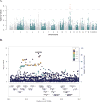Significant Locus and Metabolic Genetic Correlations Revealed in Genome-Wide Association Study of Anorexia Nervosa
- PMID: 28494655
- PMCID: PMC5581217
- DOI: 10.1176/appi.ajp.2017.16121402
Significant Locus and Metabolic Genetic Correlations Revealed in Genome-Wide Association Study of Anorexia Nervosa
Abstract
Objective: The authors conducted a genome-wide association study of anorexia nervosa and calculated genetic correlations with a series of psychiatric, educational, and metabolic phenotypes.
Method: Following uniform quality control and imputation procedures using the 1000 Genomes Project (phase 3) in 12 case-control cohorts comprising 3,495 anorexia nervosa cases and 10,982 controls, the authors performed standard association analysis followed by a meta-analysis across cohorts. Linkage disequilibrium score regression was used to calculate genome-wide common variant heritability (single-nucleotide polymorphism [SNP]-based heritability [h2SNP]), partitioned heritability, and genetic correlations (rg) between anorexia nervosa and 159 other phenotypes.
Results: Results were obtained for 10,641,224 SNPs and insertion-deletion variants with minor allele frequencies >1% and imputation quality scores >0.6. The h2SNP of anorexia nervosa was 0.20 (SE=0.02), suggesting that a substantial fraction of the twin-based heritability arises from common genetic variation. The authors identified one genome-wide significant locus on chromosome 12 (rs4622308) in a region harboring a previously reported type 1 diabetes and autoimmune disorder locus. Significant positive genetic correlations were observed between anorexia nervosa and schizophrenia, neuroticism, educational attainment, and high-density lipoprotein cholesterol, and significant negative genetic correlations were observed between anorexia nervosa and body mass index, insulin, glucose, and lipid phenotypes.
Conclusions: Anorexia nervosa is a complex heritable phenotype for which this study has uncovered the first genome-wide significant locus. Anorexia nervosa also has large and significant genetic correlations with both psychiatric phenotypes and metabolic traits. The study results encourage a reconceptualization of this frequently lethal disorder as one with both psychiatric and metabolic etiology.
Keywords: Anorexia Nervosa; Diabetes; Eating Disorders; GWAS; Genetics; Metabolism.
Figures


Comment in
-
New Genetic Discoveries in Anorexia Nervosa: Implications for the Field.Am J Psychiatry. 2017 Sep 1;174(9):821-822. doi: 10.1176/appi.ajp.2017.17050574. Am J Psychiatry. 2017. PMID: 28859512 No abstract available.
References
-
- Bulik C, Sullivan P, Tozzi F, Furberg H, Lichtenstein P, Pedersen N. Prevalence, heritability and prospective risk factors for anorexia nervosa. Arch Gen Psychiatry. 2006;63:305–312. - PubMed
-
- Watson HJ, Bulik CM. Update on the treatment of anorexia nervosa: review of clinical trials, practice guidelines and emerging interventions. Psychol Med. 2013;43:2477–2500. - PubMed
-
- Steinhausen H, Jakobsen H, Helenius D, Munk-Jørgensen P, Strober M. A nation-wide study of the family aggregation and risk factors in anorexia nervosa over three generations. Int J Eat Disord. 2015;48:1–8. - PubMed
Publication types
MeSH terms
Grants and funding
- U01 MH109514/MH/NIMH NIH HHS/United States
- K01 MH093750/MH/NIMH NIH HHS/United States
- WT088827/Z/09/WT_/Wellcome Trust/United Kingdom
- U01 MH094432/MH/NIMH NIH HHS/United States
- U01 HG006830/HG/NHGRI NIH HHS/United States
- K01 MH109782/MH/NIMH NIH HHS/United States
- K01 MH106675/MH/NIMH NIH HHS/United States
- R01 DK075787/DK/NIDDK NIH HHS/United States
- G0901245/MRC_/Medical Research Council/United Kingdom
- CIHR/Canada
- K01 MH100435/MH/NIMH NIH HHS/United States
- K02 AA018755/AA/NIAAA NIH HHS/United States
- T32 MH076694/MH/NIMH NIH HHS/United States
- WT_/Wellcome Trust/United Kingdom
- U01 MH109539/MH/NIMH NIH HHS/United States
- R01 AA015416/AA/NIAAA NIH HHS/United States
- R01 MH092793/MH/NIMH NIH HHS/United States
- U01 MH109528/MH/NIMH NIH HHS/United States

